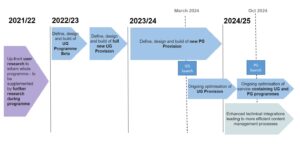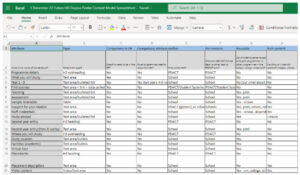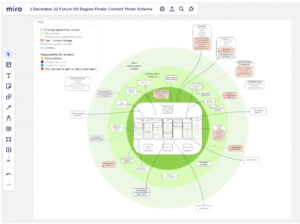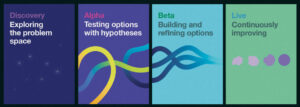Update event write up – future state for prospective undergraduate student web content
We ran an online session for marketing and student recruitment colleagues on Thursday 1 December, to share an update on our work, invite questions and comments and promote an opportunity for collaboration and co-design in the new year.
“We need prospective undergrad recruitment and marketing staff to review and feedback on this work-in-progress.
We’re looking for collaborators to co-design content in the new year.”Neil Allison (Head of Prospective Student Web Content
Agenda
The session consisted of:
- An update on progress since the last showcase in May
- An introduction to the content model we’re developing
- Summaries of some of our recent user research: course content and video
- Plans for a beta (preview) release and how undergraduate editors can get involved
Slides and video
If you couldn’t make it to the session and didn’t sign up to get later access to the video, you can do so now. Access is restricted to people with a University of Edinburgh login.
Slides from the session (Edinburgh login needed to access the Sharepoint folder)
Video recording of the online session (Edinburgh login needed)
Session summary
Project recap and update (Neil)
Neil’s introduction was largely a recap of what we talked through in May. Plans remain the same, with key points in the timeline being:
2022/23
- Design and development of the platform, ready for school engagement on undergraduate cycle
- Launch of a beta version: demonstrating functionality with a small sample of programmes
- User research and validation (postgraduate focus)
2023/24
- Design and evolution of the platform to accommodate postgraduate content
- Launch of the new presence for prospective undergraduates (March 2024)
- Ongoing testing and validation with users, informing ongoing priorities
2024/25
- Launch of the new presence for prospective postgraduates (October 2024)
- Enhanced technical integrations to deliver new user experiences in key service areas (entry requirements, fees, scholarships)

High level indication of what will happen when from 2022 to 2025.
Update since May
Our activities since we last presented:
- Funding approved by University Secretary’s Group for the 3-year project
- Procurement and legal work to bring TPX Impact (previously called Manifesto) on board as collaborators
- User research with prospective undergraduates that:
- enables us to update and validate the student experience map (shared November 2021)
- digs deeper into specific areas of student need and inform content planning
- provides extra insight on students’ content priorities in the decision-making process
- User research with students to explore the open day and in-person experience
- Content auditing and analytics to explore University-wide provision for prospective undergraduates
- Content modelling to build a shape for the future state
- Liaison and collaboration with Website and Communications (part of Information Services) to begin to establish new ways of working using the Web Publishing Platform and the Design System
Content model consultation (Lauren)
Lauren talked through our journey to the current content model we’re using to inform the development, which started with auditing and analytics work done in the summer.
Lauren covered a little of the theory – what is a content model and why do we need one – before talking about the work that she and her team had done in analysing our current provision, the insight that came from the audits of school sites, and the competitor analysis we did on other universities that we think are doing a good job.
We’ve produced two versions of the content model:
- The fine detail in a spreadsheet
- An overview schema diagram in Miro (an online whiteboard tool)

The content model spreadsheet captures the fine detail of how we plan to structure the future degree profiles content.

The content model schema is a more accessible overview. It shows the relationships between areas of content, placing the degree profile at the centre of the student’s website experience.
Lauren’s ask to the student recruitment and marketing community was for feedback.
As we proceed to development from January, we want to know in particular:
- What, if anything, are we missing?
- What are your concerns about the impact of these changes?
Links to the content model spreadsheet and schema are included in Lauren’s slide deck.
Review Lauren’s slide deck on the content model consultation (University login needed)
Ask questions or raise concerns about the content model (MS form, University login needed)
User research summaries (Pete)
Pete presented two short summaries of user insight drawn from two rounds of interviews with undergraduate offer holders and new students.
On course content (the modules studied to make up the degree):
- Students we interviewed wanted access to detailed programme and course content earlier in their decision making process
- Some hadn’t managed to find our course catalogue (the DRPS) before applying
- Those that did access the DRPS said they found it difficult to navigate and understand
While the DRPS is not a system we have remit or capacity to improve, this insight is shaping our plans in terms of we present it to prospective students and we need to think about how we can help them to better comprehend and utilise the information on offer as they investigate their options for study with us.
On video content:
- Students said they valued and wanted to engage with video content, but it’s not enough to simply translate what we want to communicate into this medium
- Some reported a lack of desire to watch longer videos, and accessibility aids like transcripts, subtitles and chaptering contributed to also impacted engagement
- We saw trends in attitudes relating to what Pete classified as subjective and objective content matter
- For subjective material (where students shared personal opinions and experiences) there was a lack of trust in content produced by the University and shared via our website
- Students reported that they used sites like YouTube and sought out independent bloggers and vloggers
Review Pete’s slide deck on this user research (University login needed)
Towards a beta delivery (Neil)
Neil concluded the session with a short explanation of what a beta delivery is, and why we felt it was a positive approach to include in our project plan.

The Government Digital Service process goes through the phases of Discovery (Exploing the problem space), Alpha (Testing options with hypotheses), Beta (Building and refining options) and Live (Continuously improving)
“The beta phase is where you take your best idea from alpha and start building it for real. It also involves thinking about how your service will integrate with (or start to replace) existing services, and preparing for the transition to live.”
While we don’t have the resources or culture within the University to rigorously adopt the GDS approach, we are following the phases and at present are beginning to test our hypotheses around particular approaches to presenting content and digital services that make up the provision to prospective undergraduates.
To help the team better understand the needs and constraints of the schools-based editors we support with the degree finder service, we want to work with a small number as we build out areas of content and work towards presenting a beta (or preview) release.
We want to learn as much as we can before development concludes and we begin using the software for real.
Taking this approach will enable us to:
- Explore the new content structure more deeply in collaboration with school-based degree finder editors
- Expose the new web page layout(s) to real students, monitor their interactions and collect their feedback
- Learn fast and evolve our development plans ahead of use by schools in late summer 2023 and go-live to website users in March 2024
Invitation to collaborate with us in early 2023
We need a small number of school-based undergraduate degree finder editors to work with us between February and May:
- Participate in a small number of online workshops
- Work with PSWCT content designers to deliver representative content for a small number of your degree programmes. This will build on and correspond to live UG Entry 2024 copy.
- Help us recruit prospective students for usability testing, and participate in testing review workshops.




4 replies to “Update event write up – future state for prospective undergraduate student web content”